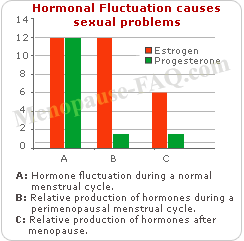 |
 |
|
|
| |
|
| |
|
 |
|
 |
|
 |
|
 |
|
| |
|
| |
|
| |
|
 |
|
 |
How does menopause affect your sex drive? |
|
|
|
Sex in different cultures has an array of norms and values attached to it. Sexual problems with women in their mid life are shown to be mainly motivated by other psychological issues rather than physiological. Usually women�s sexual libido is shown to be motivated by relationship and personal factors. |
|
Women complaining of sexual dysfunction during and after menopause came to doctors seeking a answer. Many are under the impression hormone replacement therapies will remedy it. The problem is doctors and HRT tend to treat women�s sexual symptoms as a collective problem. No ones sexual drive is generic and differs from each individual. Therefore treating it will have to be formulated according to the patient. Many believed the loss of testosterone production during and after menopause was a motivating factor. Studies were undertaken and results proved that this was no factor in the decline of low sex drive in menopausal women. HRT was also brought under light, but it showed no facilitation in improving low libido either. |
 |
|
One of the main reasons was the patients� personal feelings towards menopause and the body changes. Many still view it as a negative part of their sexuality wearing away. Many women seek to be treated with HRT to cure a lack of sexual desire.
Recent trials were done at The Department of Urology at Aalborg university Hospital in Denmark, on perimenopausal and postmenopausal women. Controlled tests were done using various estrogen/progesterone and progesterone/testosterone therapies. The results concluded that these therapies had a positive affect in the healing vaginal dryness and dyspareunia. It had shown to have positive affects on low libido, in that it created arousal but not desire. Doctors prescribe that women on HRT should be on it for the shortest time possible, and not continue with it after menopause. FSD (Female Sexual Dysfunction) has been long under investigation, and it is multi faceted as it is divided into 4 main groups: desire, arousal, orgasm and pain problems. HRT has only shown a short term affect on the physiological side such as orgasm and arousal. The rest are mainly influenced by emotional and psychological factors. It is also important to note that all four or three work together, and having the one treated does not mean low libido is healed. Inquiring for professional help would be to consult a therapist or join group therapy with your partner depending on your relationship status. HRT has shown to be most ineffective for treating FSD in menopausal women, as the source for these problems depend largely on psychological factors rather than physical.
Source: PUBMEN.NET. Gregersen, N & Jensen, P.T, �Sexual dysfunction in peri-menopause and post menopause. Status of Incidence, and Pharmalogical treatment and possible risks.�,
August 2006. |
|
|
| ©Copyright 2008. Menopause and Sex. All rights reserved. |
| Providing information on: Menopause Stages, Premenopause, Perimenopause, Menopause, Postmenopause. |